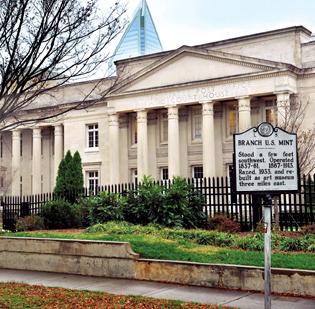North Carolina Federal Courts
Federal Courts – federal crimes are punished in federal courts (click here to learn what makes a crime federal). Federal Courts have a unique set of court procedures and rules. Court procedures and processes can be pretty confusing with a large number of rules and procedures to follow. Previously we have written about procedures regarding York County South Carolina, Criminal Courts. We have also written about criminal court procedures in North Carolina State Courts. In this blog we will briefly cover some of those same topics, with regard to the Federal Courts in North Carolina.
At Gilles Law, we practice federal criminal defense and we have often noticed that clients that have previous experience with the state court system are confused by how things are done on the federal level.
North Carolina Federal Districts
Though the same laws apply per jurisdiction, Federal Courts and State Courts are divided regionally. If you have state criminal charges in North Carolina, the state divides it by county. If you have Federal criminal charges, the Federal government divides it by district. This is typically based on where the alleged federal crime was committed. Meaning, the appropriate Federal Court will be typically be located in the district in which the federal crime occurred.
Different states have different numbers of federal districts. Some states, such as South Carolina, are all part of only one federal district. North Carolina has three federal districts:
Federal Western District of North Carolina
The Western District of North Carolina covers the following counties:
- Alexander, Anson, Ashe, Avery, Buncombe, Burke, Caldwell, Catawba, Cherokee, Clay, Cleveland, Gaston, Graham, Haywood, Henderson, Iredell, Jackson, Lincoln, Macon, Madison, McDowell, Mecklenburg, Mitchell, Polk, Rutherford, Swain, Transylvania, Union, Watauga, Wilkes and Yancey.
Federal Middle District of North Carolina
The Middle District of North Carolina covers the following counties:
- Alamance, Cabarrus, Caswell, Chatham, Davidson, Davie, Durham, Forsyth, Guilford, Hoke, Lee, Montgomery, Moore, Orange, Person, Randolph, Richmond, Rockingham, Rowan, Scotland, Stanly, Stokes, Surry, and Yadkin.
Federal Eastern District of North Carolina
The Eastern District of North Carolina covers the following counties:
- Beaufort, Carteret, Craven, Edgecombe, Greene, Halifax, Hyde, Jones, Lenoir, Martin, Pamlico, Pitt, Bladen, Brunswick, Columbus, Duplin, New Hanover, Onslow, Pender, Robeson, Sampson, Cumberland, Franklin, Granville, Harnett, Johnston, Nash, Vance, Wake, Warren, Wayne, Wilson, Bertie, Camden, Chowan, Currituck, Dare, Gates, Hertford, Northampton, Pasquotank, Perquimans, Tyrrell, Washington.
Federal Court Rules
State Courts in North Carolina are typically pretty welcoming and open to the public. While Federal Courts are also open to the public, you will typically see some pretty strict court rules in federal court including but not limited to the following.
- Electronics – Cell phones and electronic devices are typically not allowed in the courthouse even they are off or silent. There are lockers that the general public will be asked to lock cell phones in, and they will not have access while the are in the building.
- Identification – Typically, no one will be allowed in a federal courthouse without showing some sort of government issued identification.
- Schedules – Typically, Federal Courts follow much stricter time schedules than State Courts. Things tend to be more on time, and matters tend to be resolved more efficiently.
Federal criminal defense is one of the most complicated area of criminal law. If you have been charged with a federal crime, contact us. At Gilles Law, we handle federal criminal charges in both North Carolina and South Carolina.
